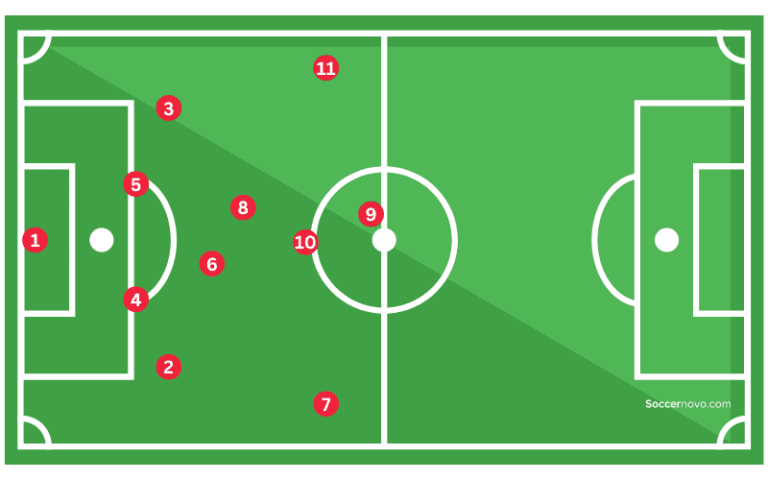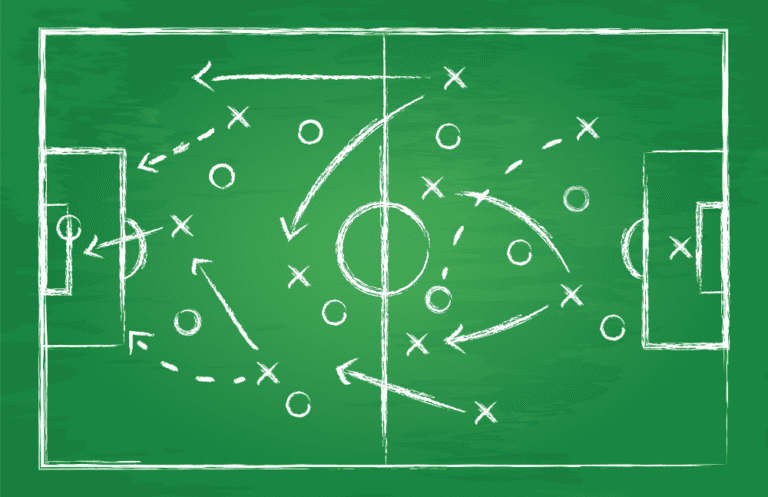Tips for Coaching Youth Soccer

Coaching youth soccer can be a challenging but rewarding experience!
Personally, my best and most impactful mentors were the coaches I had when I was younger. They were able to connect with the players, make difficult things fun, and give sound advice.
Many of the lessons they taught have stuck with me today. I can’t thank them enough.

More recently, looking back on my coaching days, I had so much fun being part of a player’s development. It was fulfilling to me to watch them grow as a person and player.
Some of them are key players in their high school. Eek, I feel old.
Whether you’re a seasoned coach or new to the game, there are several tips you can follow to make your coaching experience a successful one. Let’s do it!
What Do I Need to Do as a New Soccer Coach?
As a coach, you are responsible for teaching your players the fundamentals of the game, while motivating and communicating with them effectively.
Here are some coaching fundamentals to keep in mind:
Clear Communication
Effective communication is key to any successful team, and it starts with the coach.
As a coach, you need to be able to clearly communicate your expectations to your players, as well as provide feedback and constructive criticism.
Make sure you speak to your players in a positive and encouraging manner. Also, be open to their questions and show compassion to their concerns.
Communication is not just about talking, it’s also about listening. Take the time to listen to your players and get to know them as individuals. This will help you understand their strengths and weaknesses, as well as their motivations and goals.
Motivation
Every player is different, and what motivates one player may not work for another.
Some players are motivated by competition, while others are motivated by personal improvement or team bonding.
One way to motivate your players is to create a positive team culture. Encourage your players to support and encourage each other, and foster a sense of teamwork and camaraderie.
This will help your players feel more invested in the team’s success and more motivated to work hard and improve their skills.
Also, reward players based on performance and not because you are scarred by what their parents will say. This is your team, give your player more motivation to give their all.
Throw Out the Goals
When I originally published this article, I said the following…
Creating S.M.A.R.T goals provides young players with a purpose for playing the game with commitment, dedication, and hard work.
It’s important to develop short-term and long-term goals and focus on individual objectives for each team player to ensure they perform at their best. Collectively, this will make your team more cohesive and more aligned with the overall vision of the season.
I digress.
Instead, I think you should have zero goals. It won’t matter a year from now.
As a new coach, you should have little to no expectations from your team. Try to establish your team’s foundation by working hard, training them the best you can, and making it a fun adventure for all.
Who cares about wins, goals, assists, saves, etc.
Simply, getting better (individually and as a team) throughout the season should be the objective.
How Should I Coach Technical Skills?

Establishing technical skills early on will help players accelerate their development.
Here are some practical and basic tips to help your players improve their passing, shooting, and dribbling abilities:
Passing
Passing is a fundamental skill that every player should master. Encourage your players to:
- Keep their eyes up and scan the field to see where their teammates are positioned
- Use the inside of their foot to pass the ball accurately and with enough power
- Pass the ball to their teammate’s feet, not behind or in front of them
- Communicate with their teammates before passing the ball
We have an entire dedicated to passing to perfection.
Shooting
Scoring goals is the ultimate objective of soccer, and shooting is a critical skill to achieve this. Help your players improve their shooting by:
- Teach them the proper shooting technique, which involves planting their non-kicking foot next to the ball, looking at the target, and following through with their kicking foot.
- Encouraging them to practice shooting with both feet.
- Teaching them to aim for the corners of the goal rather than the middle.
- Teach them to shoot off the dribble rather than always be stationary.
Dribbling
Dribbling enables players to move the ball around the field while avoiding defenders. Here are some tips to help your players improve their dribbling skills:
- Teach them to keep the ball close to their feet while dribbling.
- Encourage them to use both feet while dribbling.
- Teach them to change direction quickly and use body fakes to deceive defenders.
- Encourage them to practice dribbling in tight spaces to improve their close control.
How to Coach Tactics in Soccer
By teaching your players the right tactics, you can help them improve their performance on the field.
Here are some important tactical skills to focus on:
Positioning
One of the most important tactical skills in soccer is positioning.
You need to teach your players how to position themselves on the field to maximize their effectiveness.
For example, defenders need to know how to position themselves to stop attackers, while attackers need to know how to position themselves to create scoring opportunities.
Here are some tips for teaching positioning:
- Teach your players about the different positions on the field and their roles in each position.
- Show your players how to position themselves based on the position of the ball and their opponents.
- Teach your players to communicate with each other to ensure everyone is in the right position.
- Move players around so they get a feel for what it feels like to play different positions.
Attacking Strategies
You should teach your players how to work together to create scoring opportunities. Here are some tips for teaching attacking strategies:
- Show your players how to create space on the field to receive passes.
- Teach your players how to make runs to get behind the defense.
- Show your players how to pass and move to create scoring opportunities.
Defensive Strategies
Teaching your players how to work together to stop or slow your opponent’s attack is also important.
Here are some recommendations:
- Teach your players how to mark their opponents to prevent them from receiving passes.
- Show your players how to work together to close down space and limit the opposing team’s options.
- Teach your players how to communicate with each other to ensure everyone is defending effectively.
Don’t Forget to Make Practice Fun (No Matter the Age)
One of the most important things you can do as a youth coach is to make practice FUN!
Practices that are fun, positive, and full of energy, enable kids to grow in their sport. They are more attentive and proactively want to give their all during practice.
Here are a few tips to help you make your practices more enjoyable:
- Plan your practices: Make sure you have a clear plan for each practice, including drills and games that are both challenging and fun.
- Avoid standing in lines: Waiting in line can be boring and frustrating for young players. Try to design drills that keep everyone moving and engaged.
- Keep explanations short and sweet: Kids have short attention spans, so keep your instructions brief and to the point.
- Lots of praise: Encourage your players with positive feedback and praise. This will help build their confidence and keep them motivated.
Another way to make practices fun is by incorporating games into your training sessions. Here are a few ideas:
Sharks and Minnows – a classic!
One player (the shark) tries to tag the other players (the minnows) as they run from one end of the field to the other. If a minnow is tagged, they now become a shark.

For the first few times, don’t use a soccer ball. The kids just run. Then, start introducing dribbling and tackling into the game.
Passing Relay
Divide your players into two teams. Each team lines up behind a cone. The first player in each line passes the ball to the next player, who then passes it back. The first team to complete the relay wins.
World Cup
Divide your players into teams and have them compete in a mini-tournament. Each team represents a different country and wears that country’s colors. This is a great way to build team spirit and get your players excited about soccer.
Allow Kids to Learn by Doing (Not By Teaching)
One of the most effective ways to teach children soccer is to allow them to learn by doing.
This means that you should create a practice environment that encourages experimentation and allows players to make mistakes without fear of punishment or criticism.
When players are allowed to learn by doing, they have the opportunity to develop their skills and gain confidence in their abilities.
One way to encourage learning by doing is to create small-sided games that allow players to practice different skills in a game-like setting.
For example, you can set up a 3v3 game that focuses on passing and receiving or a 2v2 game that focuses on dribbling and shooting.
By playing these games, players can learn how to apply the skills they have learned in practice to a real game situation.
Level-set with Parents
This part can’t be understated. Some soccer parents are the worst.

I’ve seen and experienced it firsthand over the years. Some parents think their child is the next Messi so they get upset if they don’t get special treatment.
When coaching youth soccer, it’s important to establish a positive relationship with the parents of your players. Here are some ways to do it…
- Communicate your philosophy and team goals with parents early on in the season. This will help set expectations and ensure everyone is on the same page. Set the expectations after one of the first practices. Huddle the parents up quickly and talk to them without the players being there.
- Encourage parents to get involved and volunteer in any way they can. This can help build a sense of community and support for your team. Almost every team needs a Manager, right?
- Be open to feedback and suggestions from parents, but also be clear about your role as the coach and the decisions you make for the team.
- Establish clear communication channels with parents, such as email, phone, or team messaging apps. Make sure parents know how and when to reach you if they have any questions or concerns.
- Set clear boundaries for communication after the game. Emotions tend to be the highest after a game is finished. Do your best to save any conversations with parents for later in the week.
At the end of the day, don’t forget this is your team! You are putting in the hours to help develop the team.
Final Thoughts on Coaching

Coaching youth soccer can be very enjoyable. The best part of being a coach is the impact you can have on a child’s season and life.
Yes, winning and losing sometimes matter. Let’s be honest, it feels good to win and it feels pretty sucky to lose. But, try to prioritize having fun and development over anything else!
By following these tips, coaches can create a positive and fun environment for their players to develop their skills and love for the game.
Remember to focus on the fundamentals first. With these strategies in mind, coaches can help their young players grow and succeed both on and off the field!
Frequently Asked Questions
Preparation is key. Preparing your practices before you step on the field allows you to focus on what you want to work on. It’s also important to keep everyone involved and make it fun!
The requirements for coaching soccer can vary depending on your location and the level of coaching you plan to do. There are usually no license requirements for your town rec or travel program. However, many private soccer clubs do require coaching licenses. You can learn more here.
Yes! If you haven’t coached before, this will get you out of your comfort zone. When coaching youth sports, you’ll make an impact on players and work on a common goal. You can mold the environment and create a positive experience for kids to hopefully pursue further. It is very fulfilling to see kids I’ve coached 7 years ago still playing.

Written By: Beau Bridges
Beau is the founder of SoccerNovo, dedicated to helping players and parents navigate the youth soccer landscape. As a former youth coach and soccer parent, he shares insights on player development, recruiting, and the ever-evolving soccer scene in the U.S.
Let’s connect





